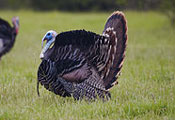The following is an excerpt from OpinionJournal.com’s “Best of the Web” written by the editor, James Taranto.
 Worst Thanksgiving Ever
Worst Thanksgiving Ever
“Kerry Struggles to Get Turkey to Mend Israel Ties”–headline, Associated Press, April 7
News of the Tautological
“In Pitkin County, Property Values Are Up, Down or Flat”–headline, Aspen (Colo.) Times, April 8
Party Like It’s 1984
Gov. Sam Brownback of Kansas is set to sign a bill imposing modest restrictions on abortion, Reuters reports: “The bill prevents employees of abortion clinics from providing sex education in schools, bans tax credits for abortion services and requires clinics to give details to women about fetal development and abortion health risks. It also bans abortions based solely on the [sex] of the fetus.”
But as the Associated Press reports, abortion proponents are especially exercised about a provision “declaring that life begins ‘at fertilization’ “
Talcott Camp, deputy director of the ACLU’s Reproductive Freedom Project, said the language could eventually “open the door to extreme interpretation of other laws. It provides something that future bill sponsors would point to, and say, ‘This is already Kansas law.’ “
Holly Weatherford, another ACLUer, frets that the stipulation could “be used as a tool of harassment.”
Hey Holly, did you know the word “gullible” isn’t in the dictionary. Just kidding, it’s there, as we noted in October. You know what else is there? “Fertilization.” Here’s Merriam-Webster’s definition 2(b), the relevant one for this discussion: “the process of union of two gametes whereby the somatic chromosome number is restored and the development of a new individual is initiated.”
This is basic reproductive biology. The assertion that life begins at fertilization is a tautology. Camp and Weatherford might as well be objecting to a legislative finding that A is A or 2+2=4 or a tautology is true by definition.
So why do they find the declaration so discomfiting? Because abortion would be easier to justify if one were ignorant of basic reproductive biology. If one imagines gestation as a process in which an inanimate lump of matter, or a part of the mother’s body, or a parasite (which by definition is an organism of a different species) grows for months before spontaneously generating an independent identity, then it is hard to formulate a moral objection to abortion prior to the moment at which spontaneous generation occurs.
Abortion is morally fraught because we know that’s not how it works. The moment human sperm meets human egg, a new human organism comes into existence. To acknowledge that basic truth is not to resolve the abortion debate, merely to assure that it is based on scientific fact. The rest of the debate is about values and practical questions: At what developmental point between zygote and adult does a human being acquire rights, especially the right not to be killed? If that point is before birth, how does one weigh the mother’s competing rights claims? (Or the father’s, for that matter, though our current legal regime grants him none even if he is married to the mother.) Apart from morality, what are the real-world consequences of regulating abortion in particular ways, or of not doing so?
If your goal is to maximize sexual freedom, then it’s expedient to answer the abortion question in the most permissive way possible. We suppose in that case simply defying science and logic, as Camp and Weatherford do, is a tempting shortcut. But when your position depends on denying a tautology, you may find it a difficult one to defend.
This is only one of three examples we noticed over the weekend of sexual liberationists doing violence to language and logic. National Review’s Wesley Smith notes that in California, “legislation has been filed that would require group insurance to cover gay and lesbian infertility treatments just as they do heterosexual.”
In 1973 the American Psychological Association removed homosexuality from its list of mental disorders. That was a value judgment more than a scientific one–an early sign of a cultural shift toward viewing homosexuality as a normal variation of human behavior rather than a manifestation of sickness or evil. As to the scientific question of what combination of nature, nurture and volition gives rise to homosexuality, the jury is still out 40 years later.
But one indisputable fact about homosexual behavior is that it cannot result in reproduction. Thus “gay and lesbian infertility” is either a redundancy or an oxymoron, like “female impotence” or “male hypolactation.” As Smith explains in The Weekly Standard, the proposal would mean that “every gay individual or couple . . . could be construed as infertile, with group insurance required to pay for the individual or couple to have a child.”
Since “infertility” is inherent in homosexuality, what California is proposing to do is once again define homosexuality as a disease–not in order to stigmatize gays but in order to subsidize them. …
For more “Best of the Web” click here and look for the “Best of the Web Today” link in the middle column below “Today’s Columnists.



